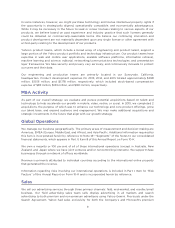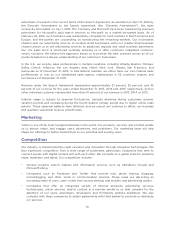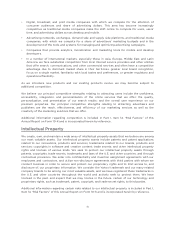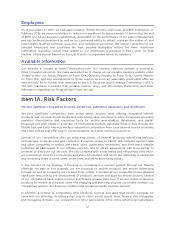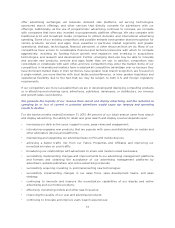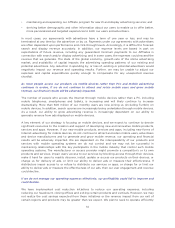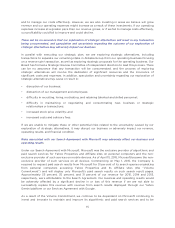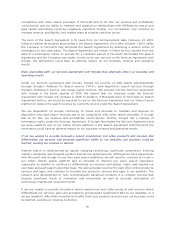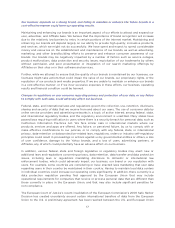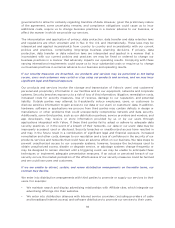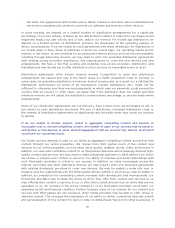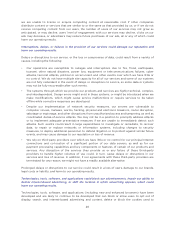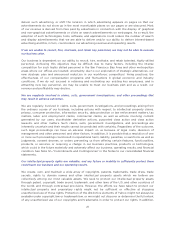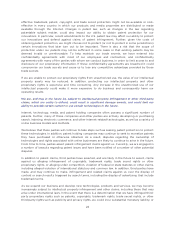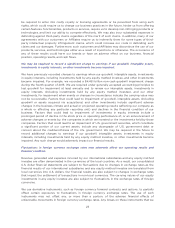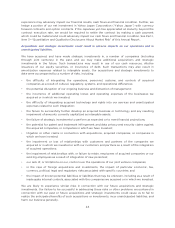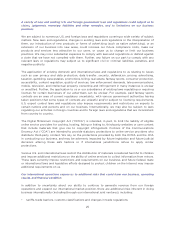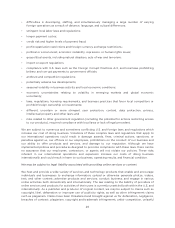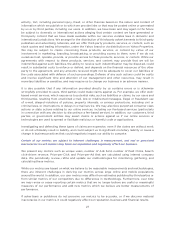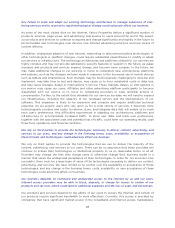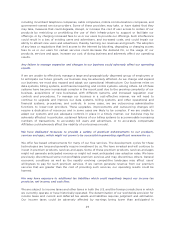Yahoo 2015 Annual Report Download - page 23
Download and view the complete annual report
Please find page 23 of the 2015 Yahoo annual report below. You can navigate through the pages in the report by either clicking on the pages listed below, or by using the keyword search tool below to find specific information within the annual report.• We enter into agreements with mobile phone, tablet, television, and other device manufacturers,
electronics companies and carriers to promote our software and services on their devices.
In some markets, we depend on a limited number of distribution arrangements for a significant
percentage of our user activity. A failure by our distributors to attract or retain their user bases would
negatively impact our user activity and, in turn, reduce our revenue. For mobile app distribution, we
depend on a limited number of distributors, primarily the developers of the operating systems or
device manufacturers. If we are unable to reach agreements with these distributors for distribution of
our mobile apps or they refuse to distribute or block our mobile apps, our operating results will be
harmed. In the future, as new methods for accessing the Internet and our services become available,
including through alternative devices, we may need to enter into amended distribution agreements
with existing access providers, distributors, and manufacturers to cover the new devices and new
arrangements. We face a risk that existing and potential new access providers, distributors, and
manufacturers may decide not to offer distribution of our services on reasonable terms, or at all.
Distribution agreements often involve revenue sharing. Competition to enter into distribution
arrangements has caused and may in the future cause our traffic acquisition costs to increase. In
some cases, we guarantee distributors a minimum level of revenue and, as a result, run a risk that the
distributors’ performance (in terms of ad impressions, toolbar installations, etc.) might not be
sufficient to otherwise earn their minimum payments, in which case our payments could exceed the
revenue that we receive. In other cases, we agree that if the distributor does not realize specified
minimum revenue we will adjust the distributor’s revenue-share percentage or provide make-whole
arrangements.
Some of our distribution agreements are not exclusive, have a short term, are terminable at will, or
are subject to early termination provisions. The loss of distributors, increased distribution costs, or
the renewal of distribution agreements on significantly less favorable terms may cause our revenue
to decline.
If we are unable to license, acquire, create or aggregate compelling content and services at
reasonable cost, or receive compelling content, the number of users of our services may not grow as
anticipated, or may decline, or users’ level of engagement with our services may decline, all of which
could harm our operating results.
Our future success depends in part on our ability to aggregate compelling content and deliver that
content through our online properties. We license from third parties much of the content and
services on our online properties, such as news, stock quotes, weather, sports, video, and photos. In
addition, our users also contribute content to us. We believe that users will increasingly demand high-
quality content and services. We may need to make substantial payments to third parties from whom
we license or acquire such content or services. Our ability to maintain and build relationships with
such third-party providers is critical to our success. In addition, as users increasingly access the
Internet via mobile and other alternative devices, we may need to enter into amended agreements
with existing third-party providers to cover new devices. We may be unable to enter into new, or
preserve existing, relationships with the third-parties whose content or services we seek to obtain. In
addition, as competition for compelling content increases both domestically and internationally, our
third-party providers may increase the prices at which they offer their content and services to us,
stop offering their content or services to us, or offer their content and services on terms that are not
agreeable to us. An increase in the prices charged to us by third-party providers could harm our
operating results and financial condition. Further, because many of our licenses for our content and
services with third parties are non-exclusive, other media providers may be able to offer similar or
identical content. This increases the importance of our ability to deliver compelling editorial content
and personalization of this content for users in order to differentiate Yahoo from other businesses. If
19


